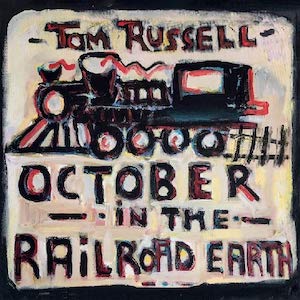 Tom Russell – October in the Railroad Earth
Tom Russell – October in the Railroad Earth
Proper Records – 15 March 2019
A songwriter, musician, author and artist who is represented by six major world galleries and whose work can be found in several major museums, the very definition of a Renaissance man, Russell describes his third album in two years as “Jack Kerouac meets Johnny Cash in Bakersfield.” It’s the former who provides the inspiration for the title track opener, lifted from one of Jack Kerouac’s prose poems (an extract from his recitation appearing on Russell’s Hotwalker album), and, riding a Cash train-time chug Bill Kirchen on Telecaster, the song references his time working as a brakeman in San Francisco and the “cannonball soul” that drove him, asking whether the pursuit of fame was worth the cost.
That was also the theme behind the 2006 film Small Engine Repair in which Iain Glen played an aspirant country singer in a nondescript Irish town, the narrative based around Russell’s song and performed by Glen in the film. A classic sounding Russell number about smalltown blue-collar pride was originally written about the man who fixed his lawnmower and this is the first time he himself has recorded it.
Over the years and some 35 albums, Russell has proven a master of spinning a story, some fictional, some autobiographically based, and ‘T-Bone Steak and Spanish Wine’ is, one such, a simply strummed song about revisiting a steakhouse in Northern California he’d played three sets a night 40 years earlier and finding that, while the Canyon had been torn apart by wildfires and the clientele was now mostly old and retired, for whom the music was just background noise, the house special on the “chalkboard sign” remained the same, he and the owner chewing over old times and singing some old songs.
Again time passing and the path to making a name underscore the lyrics, and he returns to question the value of fame in Isadore Gonzalez, a Tex-Mex corrido featuring Max and Josh Baca from Tex Maniac and complete with whoops, based on the true story of the Mexican vaquero who appeared in Buffalo Bill’s Wild West Show and is buried in an unmarked grave in Bristol after being killed when his horse fell on him during a show.
Another true story about fame turned sour, pitched somewhere been Cash and Kristofferson, the part spoken, part sung Red Oak Texas recounts (by way of an aged bartender’s story) the tale of twin brothers who, delinquents at school, respectively joined the Army and the Marines and became heroes fighting in the Middle East, but were unable to readjust on their return, having “learned how to fight but not to heal”, the one locking himself in his room for two years reading the WWI poetry of Robert Graves, “until there was no minds left to save”, the pair buried together in the National Cemetary.
The shortest track at just three minutes, Eliza Gilkyson on harmonies, Back Streets of Love asks “where are we now, who are we anyhow?” using the idea of a GPS, a hunting hawk and a couple lost trying to navigate the interstate of life, the answer to his own global positioning being “an artist and musician driven by a signal deep in the blood.”
Returning to autobiographical inspiration, the marching beat, strident guitars and again semi-spoken Hand-Raised Wolverines, arguably the album’s centerpiece, uses the experience of a visit to a private game park in Canada and being let inside a cage of semi-tame wolverines, the fiercest animals on earth, encountering “fear so very close like you could taste it”, serving as a metaphor for the meaningless of the modern world with all its “rhetoric and craft beer morality.”
The Bakersfield reference is manifested, musically and lyrically, on Highway 46, the road on which James Dean died to continue the theme of fame and mortality, on which, backed by pedal steel, he reflects on the passing of vintage country legends Spade Cooley, Wynn Stewart, Merle Haggard and Buck Owens.
It’s back to family memories for another (cautionary) strummed story-song, Pass Me The Gun, Billy, recalling how, back in the mid 60s, he was living on his cowboy brother Pat’s ranch in California when they heard someone rustling the cattle, called up a neighbour, and set off to run them down only to find themselves in a stand-off, but without a gun between them.
Riding plangent, twang guitars and steady drumbeat, the title of the last of the self-penned tracks, When The Road Gets Rough, stems from a comment from his wife Nadine, when he and the band were stuck in traffic en route to a gig in England, the driver coughing, the guitar player complaining about his cheap, cold hotel room and the cafes en route offering little by the way of culinary delights. A musically spirited ode to life on the road, as the song says, you “earn your pay on those 8-hour drives” but hey, it’s better than the alternatives, so, “bring on that rock ‘n’ roll… find out if we’re tough enough, let’s go out and call their bluff.”
It ends with Johnny Cash, Russell declaring his fondness for country songs about drinking, cheating, murder and trainwrecks as he introduces the first thing he learned to play as a kid, Wreck of the Old 97, the true story of the 1903 wreck of the Southern Railway mail en route from Virginia to North Carolina, and featured on Cash’s first Sun release, The Hot and Blue Guitars of Johnny Cash. The opening Raymond Chandler quote about being an “occasional drinker …who goes out for a beer and wakes up in Singapore with a full beard”, a reminder of how, for a long while, fame led Cash down his own self-destructive path.
Rolling Stone once declared Russell to be “the greatest living folk-country songwriter”. This album offers no reason to disagree.
